Top Strategies to Support Early Childhood Development
- Young Rizz

- Jun 18, 2025
- 4 min read
Supporting early childhood growth is crucial for laying a strong foundation for a child's future. During these formative years, children develop critical skills that influence their emotional, social, cognitive, and physical wellbeing. By employing effective strategies, parents, caregivers, and educators can play a significant role in promoting healthy development.
Effective Childhood Growth Strategies
Creating a nurturing environment is essential for childhood growth. Children thrive when they feel safe and loved. A supportive atmosphere provides the basis for learning and exploration. Here are strategies that can be effective in supporting early childhood growth:
Promote Play-Based Learning
Play is more than just fun; it is a vital component of childhood development. Children learn through play as they explore their surroundings and interact with their peers. Incorporating play-based learning into daily routines can enhance cognitive development and fine motor skills.
For instance, building blocks encourage problem-solving and spatial awareness, while role-playing scenarios can boost creativity and social skills. Ensure play spaces are safe, age-appropriate, and diverse to keep children engaged.

Encourage Social Interactions
Social skills are vital for success in life. Interaction with peers teaches children how to communicate, collaborate, and manage conflicts. Encourage your child to join group activities, such as sports teams or creative classes, where they can meet new friends.
Teach empathy and understanding by discussing feelings and emotions. Role-play different social scenarios to practice responses. The more children interact with others, the more confident they become in their abilities to form relationships.

Support Emotional Development
Emotional regulation is a key aspect of childhood growth. It is essential for children to learn how to identify and express their feelings appropriately. One effective strategy is to create an emotional “toolkit” at home, filled with resources like books and visual aids illustrating various emotions.
Encourage discussions about feelings by using stories and experiences. Ask open-ended questions about how various situations might make them feel. Validate their emotions to help them understand that it is okay to express themselves.
Enhance Language Skills
Language development is crucial during early childhood. Reading to your child daily can significantly foster their vocabulary and comprehension skills. Choose diverse books that resonate with children’s interests to keep them engaged.
Incorporate singing, rhyming, and storytelling into your routine. These activities help develop language skills and improve memory. Additionally, ask open-ended questions about the story to encourage critical thinking and expression.

Foster Physical Development
Physical activity is essential for healthy growth. Age-appropriate exercises promote coordination, balance, and strength. Limit screen time and encourage outdoor activities like cycling, hiking, or even simple games like tag.
Create a structured routine that incorporates physical activity. Such activities help develop motor skills while promoting a healthy lifestyle as children learn the importance of staying active. Choose fun activities that your child enjoys to cultivate their love for movement.
Create a rich and stimulating environment
A stimulating environment contains various materials that stimulate curiosity and exploration. Include art supplies, building materials, and sensory items like sand or water play in your child’s environment to encourage hands-on learning.
Rotate these materials regularly to maintain interest and engagement. A structured yet flexible routine can maximize the benefits of a stimulating environment, as it balances exploration with the need for security and predictability.
Make Learning a Collaborative Experience
Involving children in the learning process fosters independence and critical thinking. Encourage them to ask questions and explore topics that interest them. Join them in their discoveries and discussions. This collaborative approach nurtures their curiosity and reinforces positive learning outcomes.
Ask your children to share their thoughts during activities, and engage them in setting goals. Celebrate their accomplishments, no matter how small, and encourage their self-directed learning.
Prioritize Nutrition and Sleep
A balanced diet and adequate sleep are foundational to childhood growth. Proper nutrition fuels their bodies and minds, while sufficient sleep promotes learning and development. Create meal routines that involve nutritious food choices, introducing a variety of colors, textures, and flavors.
Ensure that children have a consistent bedtime routine that allows them to get the recommended hours of sleep for their age group. Promote good sleep habits by creating a relaxing sleep environment, thus paving the way for optimal growth and development.
Emphasize the Importance of Routine
Establishing a routine helps children feel secure and know what to expect. Regular daily schedules, including consistent mealtimes, playtimes, and bedtime, contribute to a sense of stability. Children thrive on structure; it helps them develop self-discipline and time management.
Be flexible with routines but maintain key aspects that promote well-being. Adjustments for special occasions can be made, but ensure that core elements are consistently practiced.
Final Thoughts on Childhood Growth Strategies
Supporting childhood growth is a multifaceted process that involves a wide range of strategies, including play-based learning, social interactions, emotional support, and physical activity. By implementing these effective strategies, you can contribute significantly to your child's early development. Investing time and effort into your child's growth will not only benefit them in the short term but will also lay the groundwork for a successful future. For more resources, you can explore early childhood development programs designed to support families and caregivers in this essential journey.



Comments